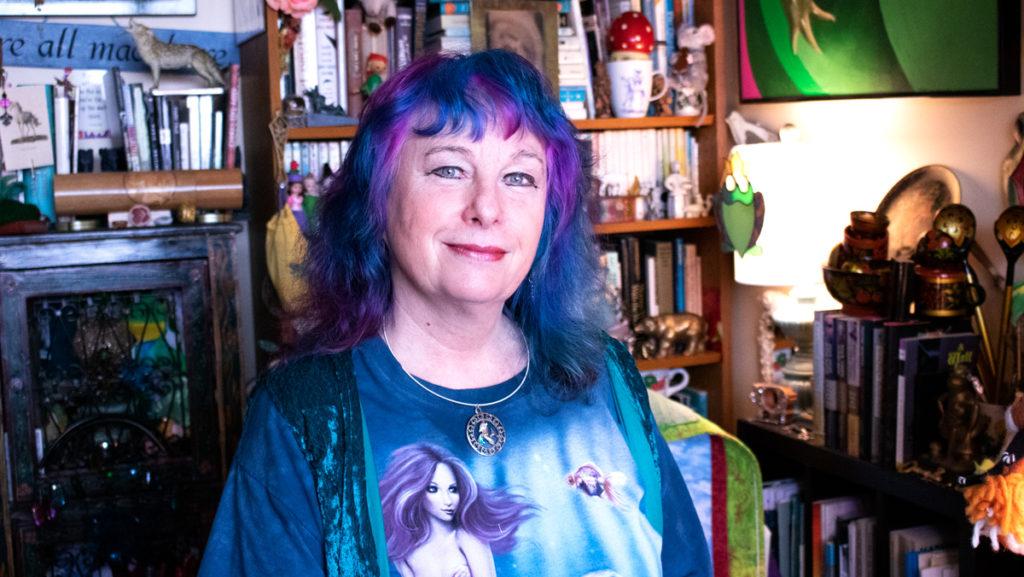Katharyn Howd Machan, professor in the Ithaca College Department of Writing, has been writing poems about her relationship with her daughter since 1987, and she recently published her collection, titled “A Slow Bottle of Wine.” The collection is about Machan’s experiences with love and her daughter’s former heroin addiction.
“A Slow Bottle of Wine” is the 2019 winner of the Jessie Bryce Niles Chapbook competition, which is a national contest hosted by The Comstock Review.
Machan has been teaching at college since 1977. She has published 38 collections of poems. “A Slow Bottle of Wine,” which is her 39th collection, is projected to be released in mid-February.
Staff writer Julia DiGeronimo spoke with Machan about the inspirations for the collection and her work as a poet.
This interview has been edited for length and clarity.
Julia DiGeronimo: When did you start writing poetry?
Katharyn Howd Machan: I started writing poetry when I was very little. I wasn’t good at much else. I took lots of dance classes and this and that, sports and all that. I was never very good, but I could write. I remember my first little book I put together. I think I was 8 years old. … It was about 1967, so I’ve been writing for half a century.
JD: What does being a poet mean to you?
KHM: I will take you right to where I always quote [the] wonderful Gary Snyder. He says that a poet should create “communitas.” That’s a Latin term. … The role of the poet is to make the community happen, to bring together in a very important way. … The writer Herbert Gold said that, at a time of war, you need soldiers to protect you. You need doctors to help with the bodies that are hurt in that war. What do you do about the spirit and the soul? That’s when you turn to the poet.
JD: How did you get the name “A Slow Bottle of Wine?”
KHM: “A Slow Bottle of Wine” is a titled poem in the collection, and it’s based on my time in Provence, France, in 1987.
JD: Could you summarize what the collection is about, or are they all their own stories?
KHM: This is a very tightly thematic collection, “A Slow Bottle of Wine.” It opens with poems from 1987 when I traveled to France and fell in love with a man that I thought was quite wonderful. … He turned out to be a very dangerous man and drank very heavily. He threatened me one night with a gun and a stiletto. I had to flee … not knowing I was pregnant with my daughter. The story in the poems [goes] on from there. … “A Slow Bottle of Wine” emerged out of the dark shadows of addiction for her. In her late teens, she became addicted to heroin. … I was absolutely helpless. I almost lost my mind. It was my poetry, writing the poems, that helped me survive, trying to come to grips with what had happened to my daughter. … Here’s the most beautiful part: She has been clean for nine years. … To me, this is a book that people can read, and, I hope, find healing in some way. Life can go on, even in the darkest shadows.
JD: What do you think your favorite poem or part of “A Slow Bottle Of Wine” is?
KHM: My favorite part is very difficult to say because I worked very hard to make it a cohesive collection. There really isn’t one that I would say stands out for me. … To me, the most important part is not a single poem but for people to read, essentially, a narrative done with lyrical poems.
JD: How does the collection compare to your other works?
KHM: This one is intensely autobiographical, but I’ve had several other collections that are that way as well. It seems that editors seem to really like autobiography. … The idea of revealing the self to help others, be an example to others, that … can help in your emotional survival, psychological survival — to write your stories down.
JD: What did it feel like to win the Jessie Bryce Niles Chapbook competition?
KHM: Winning the Jessie Bryce Niles Chapbook competition is very important to me. … I know that they had hundreds of applicants, and, when the judge called me, which was an honor in itself, she wanted to talk to me about the book and tell me that out of the 25 finalists, mine rose up so much higher than the others. … It’s very deeply gratifying to be selected when there’s [so much] competition for poetry now.














